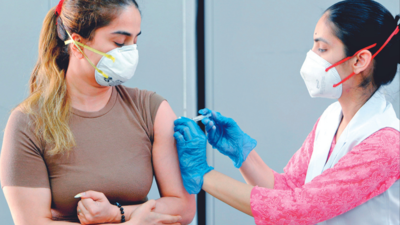Trending
This story is from March 9, 2022
Mixing Covishield, Covaxin doses gives better immunity, says ICMR study
A study by the Indian Council of Medical Research (ICMR) has found that mixing the two lead Covid-19 vaccines — Covishield and Covaxin — produced a better immune response than a same-dose schedule.

Dr Panda said though the study size was small (88 people), it helped prove robust immune response in the heterologous group. (Representational pic)
The research paper — yet to be peer-reviewed — stated that despite a weakening in antibody response after six months, those in the heterologous group — given one dose of Covishield and second dose of Covaxin six weeks apart — showed a better immune response than those in the homologous group — people given either Covishield or Covaxin as both doses.

For the study, ICMR researchers analysed people in a village in Uttar Pradesh who were inadvertently given Covishield as their first dose and Covaxin as the second. Their immune responses were studied over a period of six months after the completion of their vaccination schedule.
Two other groups were involved in the study — those who had taken two doses of either Covaxin or Covishield.
Researchers found a significant drop in the IgG antibody titers targeting the receptor binding domain of the virus’ spike protein, in all groups. “But the mix and match group still had higher IgG antibody titers than the other two groups,” said Dr Samiran Panda, additional director-general of ICMR New Delhi.
He said, “The comparative analysis in all three groups, at one and six months post-vaccination, showed modest reduction in neutralizing antibody titers against B.1, Alpha, Beta and Delta variants, and more so against Omicron. But those who had received the mix and match of Covishield and Covaxin had higher neutralizing antibodies against these variants.”
The study states that the homologous Covishield group had lower neutralization response against B.1, Alpha, Beta, Delta and Omicron, compared to the heterologous group (Covishield/Covaxin). The homologous Covaxin group had lower neutralizing antibody response against these variants compared to the heterologous group.
Dr Panda said though the study size was small (88 people), it helped prove robust immune response in the heterologous group. Dr Pragya Yadav and Dr Gajanan Sapkal from ICMR-NIV and Dr Rajni Kant Srivastava from ICMR-Regional Medical Research Centre, Gorakhpur, were part of the study team.

About the Author
Neha MadaanEnd of Article
FOLLOW US ON SOCIAL MEDIA






